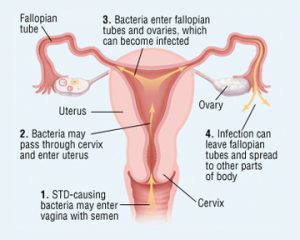 Pelvic inflammatory disease
Pelvic inflammatory disease
Pelvic inflammatory disease (PID) is an infection of the female reproductive organs. It usually occurs when sexually transmitted bacteria spread from your vagina to your uterus and upper genital tract.
Many women who develop pelvic inflammatory disease either experience no signs or symptoms or don’t seek treatment. Pelvic inflammatory disease may be detected only later when you have trouble getting pregnant or if you develop chronic pelvic pain.
Symptoms
Signs and symptoms of pelvic inflammatory disease may include:
- Pain in your lower abdomen and pelvis
- Heavy vaginal discharge with an unpleasant odor
- Irregular menstrual bleeding
- Pain during intercourse
- Low back pain
- Fever, fatigue, diarrhea or vomiting
- Painful or difficult urination
PID may cause only minor signs and symptoms or none at all. Asymptomatic PID is especially common when the infection is due to chlamydia.
When to see a doctor
Go to the emergency room if you experience the following severe signs and symptoms of PID:
- Severe pain low in your abdomen
- Vomiting
- Signs of shock, such as fainting
- Fever, with a temperature higher than 101 F (38.3 C)
If your signs and symptoms aren’t severe, but they’re persistent, see your doctor as soon as possible. Vaginal discharge with an odor, painful urination or bleeding between menstrual cycles can be associated with a sexually transmitted infection (STI). If these signs and symptoms appear, stop having sex and see your doctor soon. Prompt treatment of an STI can help prevent PID.
